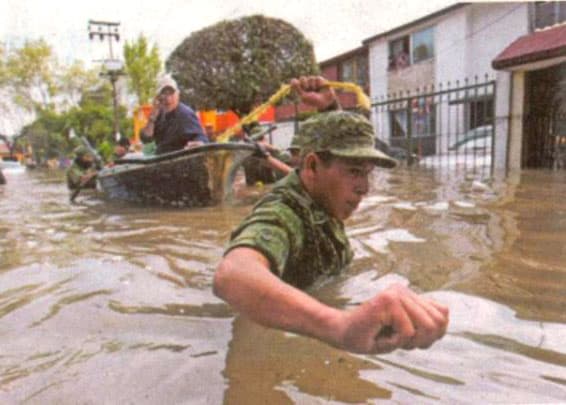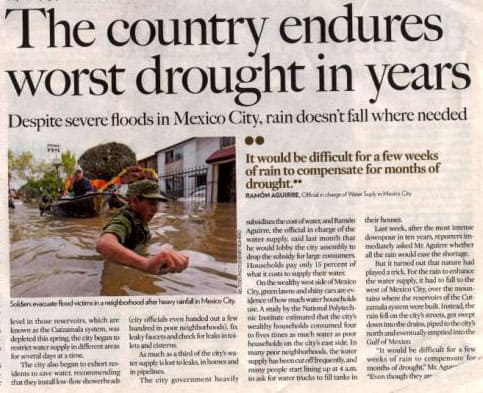
You can see below that I live in Tlalnepantla in the state of México that is a suburb of the District Federal (México City, DF). Tlalnepantla, a city of about 75,000, abuts the DF on the Northwest side. Our neighborhood is mainly a middle class area with professionals and retirees.

In the Northwest side of Tlalnepantla, we run into the beginnings of the mountains that ring the Valle de México, which is literally a big bowl, the remnant of an ancient vast volcano. Although active volcanoes ring the Valle de México, none are close to the actual valley.
As a result, a few blocks to the North and west are the start of the hills that turn into mountains. Occasionally, a heavy rain up in those hills can cause a good runoff down into the valley. But on Sunday night, 6 September, it turned into something beyond a „runoff.”
It started off as a heavy steady rain that would be graded as „intense.” This lasted for more than three hours. I ended up simply going to bed in my bedroom that is on the second floor of our three-story house. Later I was woken up by what seemed to be a large truck. I thought that odd, but went back to sleep. I found out later that it was our refrigerators falling over in the water downstairs.
On Monday morning I looked out on the street . . . and almost fell over. The street was filled with about 5 feet of water. And there were three boats; manned by army personnel looking for people that needed rescue. Over head there a number of military helicopters and that was an almost continuous sound over the following week. Then came an even stronger shock. Trying to go downstairs to the first floor, I was met with the entire first floor under 4 feet of muddy water. The first floor consists of the auto garage, the living and dinning room, the kitchen and laundry room and my business office. I turned around and went up to the third floor that is where my personal office is located. Found that the telephone line was out along with my Internet access.
Having no cell phone, I was able to go to a neighbor’s home across the street two days later and make a cell call to my wife who was out of town at the time. She came home the next day with her son and by that time, the water in the street was only about 6 inches deep. By this time (Wednesday) the street was filled with federal, state and local disaster relief personnel with an impressive array of heavy equipment. One pump truck with a huge tank was about one quarter of a block long! This is city owned.
Officials went from home to home to find out what they needed. We were able to get a five-man team and worked along side of my stepson and an employee from the company that I work for. They got all of the mud out that day. Remember that this water carried a lot of mud with it and left a good six inches of black muck everywhere. The state crew refused any offer for payment for their effort.
We also found out that soup kitchens had been set up every couple of blocks in parks along with medical services to administer tetanus and hepatitis shots. Again, no charge. The authorities understand that all kitchens are on the first floor and most of the food has been destroyed and people need food. There was also a good supply of common prescription medicines if you were in need of this.
While my wife and I went for shots, a man stopped at the house and asked my stepson what we needed. He mentioned that we had lost our microwave oven. The next day, a man delivered a brand new microwave! No charge. There is a whole litany of government help available for us. Although our disaster area is about two or three square miles, the Mexican government was there with fast and effective help.
Later, after filling in some paperwork listing our losses, the government issued us a paid up credit card to aid us in replacement purchases.
Lots of little things come to mind. Like when my wife and I were taking turns lugging a 5-gallon bottle of water from the soup kitchen facility, an army corporal told us, in no uncertain terms to stop. Then he picked up the bottle and asked us where our home was.
My wife and I belong to the over sixty-five club. We carry a federal/state senior citizen identification that provides discounts for many things like medicine.
Although many from outside of México belittle our military, it is worth mentioning that one of the biggest functions of the military is disaster relief. México has not fought a „real war” for a century and a half. It is only in the past few years that our military has been involved in actual heavy combat. This is, of course, the raging drug war that continues.
No, this was not a „Katrina” disaster, but the Mexican government did a lot better here than was done at that time.
For receiving any of this aid, all that was necessary was to prove that you are a resident here.
It will take quite a while to sort through all of our things and decide what will have to be replaced. And now is the time you find out how many good friends you have. Our auto is in an auto repair shop and our mechanic tells us that he can make it go again. In the meantime, it is take a taxi or bus everywhere.

___________________________________________________________
Richard N. Baldwin T., a HispanicVista.com (www.hispanicvista.com) contributing columnist, lives in Tlalnepantla, Edo de México. E-mail at: R1041643422@aol.com
